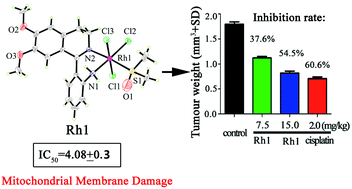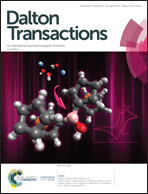Rhodium(iii) complexes with isoquinoline derivatives as potential anticancer agents: in vitro and in vivo activity studies†
Abstract
Two rhodium complexes Rh1 and Rh2 with isoquinoline derivatives were synthesized and characterized. Both complexes displayed strong anticancer activity against various cancer cells and low cytotoxicity against non-cancer cells. These complexes triggered apoptosis via mitochondrial dysfunction that increased the levels of ROS and Ca2+ and released cytochrome C which ultimately activated caspases and the apoptosis pathway. The different biological activities of Rh1 and Rh2 could be associated with the presence of methoxy substituents on the ligands. In vivo studies showed that Rh1 effectively inhibited tumor growth in a T-24 xenograft mouse model with a less adverse effect than cisplatin. Overall, Rh1 and Rh2 induced apoptosis via mitochondrial pathways and could be developed as effective anticancer agents.



 Please wait while we load your content...
Please wait while we load your content...